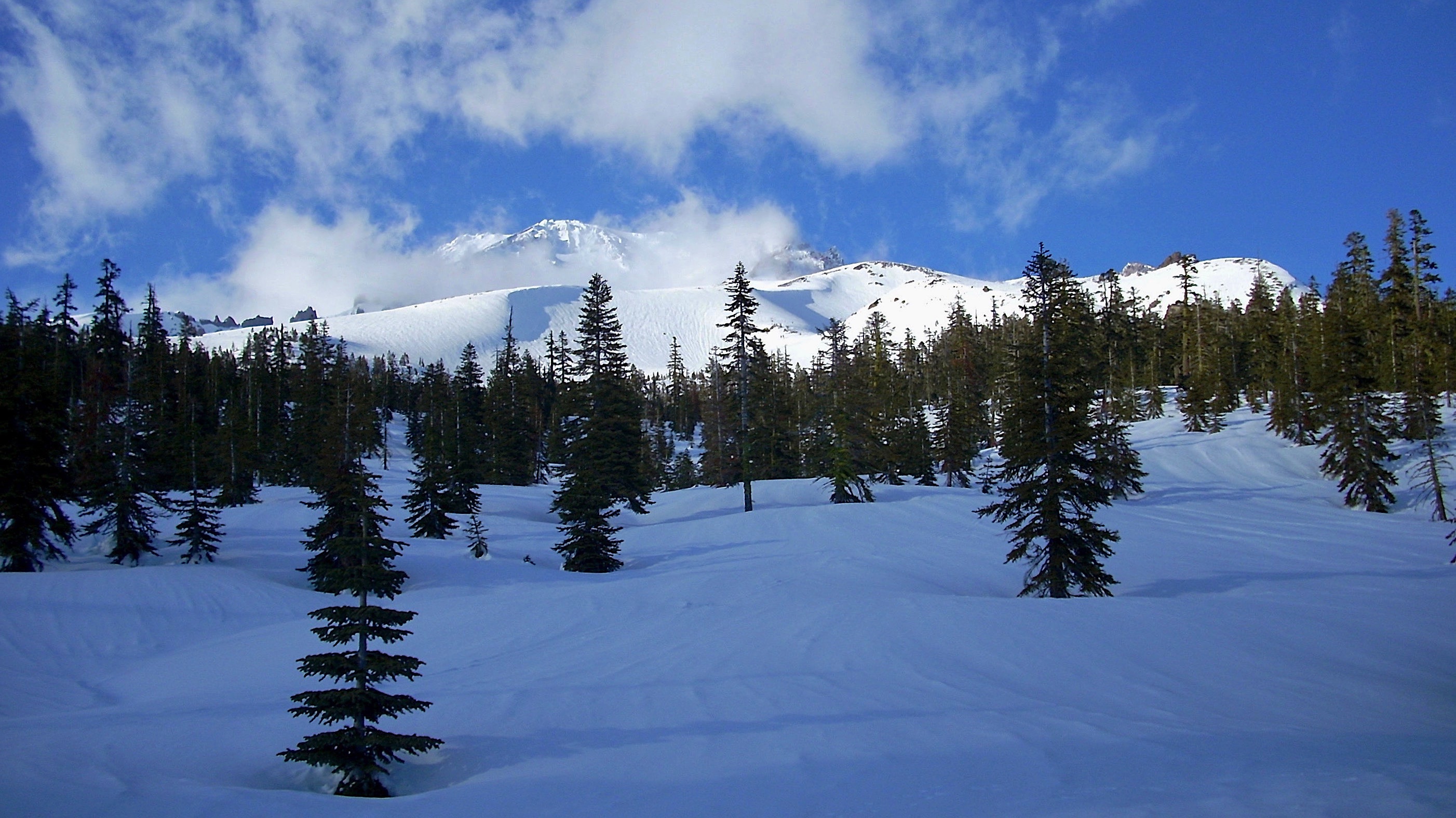News Articles Page 2
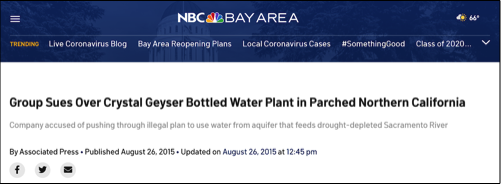
8/26/2015
A group of neighbors and activists has sued bottled water company Crystal Geyser and Siskiyou County over plans to build a bottling plant near Mount Shasta in parched Northern California.
The San Francisco Chronicle reports Wednesday that the suit accuses Crystal Geyser of pushing through an illegal plan to suck thousands of gallons of water a day from an aquifer that feeds the drought-parched Sacramento River.
The group says the company failed to get proper permits and will be violating
land-use provisions if it carries out its plan this fall to tap Big Springs, which burbles out through lava tubes at the base of California's largest volcano, the newspaper reported.
"The ultimate goal is to have an environmental impact report,'' said Bruce Hillman, president of the board of directors for the nonprofit group We Advocate Thorough Environmental Review. "We don't know what the effect of this plant will be on the local environment, so we are asking for an injunction until these issues have been decided.''
Siskiyou County was also named in the suit for allegedly ignoring its own rules and pushing the project through.
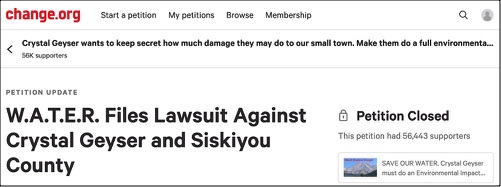
8/25/2015
After 2 years of attempting to work with local government agencies to obtain a fair Environmental Impact Report (EIR), W.A.T.E.R. has filed a “Complaint for Declaratory and Injunctive Relief” against Crystal Geyser Water Company and Siskiyou County. The complaint was filed in Napa County Superior Court, the location of Crystal Geyser Water Company’s corporate offices.
The complaint states Crystal Geyser Water Company’s planned operation of a bottling facility for the processing of teas and other beverages, including the
production of plastic bottles, is inconsistent with the Siskiyou County Zoning Ordinance and the Siskiyou County General Plan as the facility is located in a “Woodland Productivity” overlay, which designates the land for light-industrial use, not heavy-industrial use. The lawsuit also claims that the Crystal Geyser’s operations will violate the County’s groundwater ordinances, which provide that it is unlawful to extract groundwater for use outside the basin from which it was extracted without obtaining a written permit from the County.

8/25/2015
An environmental group opposed to a bottling plant near Mount Shasta filed a lawsuit accusing Crystal Geyser of pushing through an illegal plan to suck thousands of gallons of water a day from an aquifer that feeds the drought-diminished Sacramento River.
The group called We Advocate Thorough Environmental Review, or Water, filed the suit Monday in Napa County Superior Court, claiming the Calistoga
company failed to get proper permits and will be violating land-use provisions if it carries out its plan this fall to tap Big Springs, which burbles out through lava tubes at the base of California’s largest volcano.
Siskiyou County was also named in the suit for allegedly ignoring its own rules and “rubber stamping” the plant, said Bruce Hillman, president of the nonprofit group’s board of directors.
“The ultimate goal is to have an environmental impact report,” Hillman said. “We don’t know what the effect of this plant will be on the local environment, so we are asking for an injunction until these issues have been decided.”
The purveyor of sparkling mineral water and juice was not required to do such a report or obtain a permit from the state to open the plant, even though it will use drinking water that would normally go to millions of Californians struggling to cope with the four-year drought.
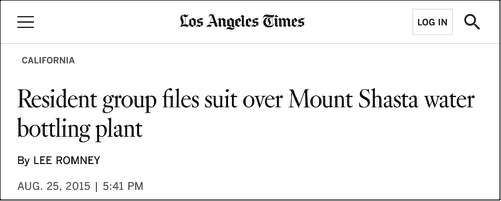
8/25/2015
Neighbors and activists in Mount Shasta have been pressing Crystal Geyser Water Co. for months to conduct a full environmental review before opening a bottling plant just outside the small Northern California town.
On Monday, the group sued the Calistoga-based company and Siskiyou County, turning up the heat on a topic that has resonated with many as the state dries up: Should bottlers be able to pump unlimited amounts of water for sale during a drought?
Overall, bottlers use a tiny fraction of the state’s water. But environmental impacts vary depending on the watershed.
Residents whose homes and wells border the Mount Shasta plant worry that Crystal Geyser’s facility could leave them dry, and contend that some wells ran low when Coca-Cola was pumping there.
The plant sits just outside city limits but would rely on the city sewage plant. It draws on water that filters through the fractured volcanic rock of towering Mt. Shasta, forming the headwaters of the Sacramento River.
The lawsuit, filed in Napa County Superior Court, asserts that because the plant will produce flavored beverages and blow-molded plastic bottles, it requires the kinds of discretionary permits that would trigger environmental review under California law.

5/11/2015
Nine years ago, Raven Stevens moved to Mount Shasta, California, after being priced out of the housing market in Santa Cruz, where she had lived for 27 years. She describes the picturesque mountain town just south of the Oregon border as a community “in transition.” By that she means two things: it is an economy moving from logging to more sustainable industries, such as tourism. And it is a community being overtaken by transplants from the Bay Area, like herself.
“We bring our crazy ideas with us,” she says. “And we get a hard time for that. We’ll never be locals. I’ve heard some people say, ‘You people should just go back to where you came from.’”
The house Stevens and her partner purchased in Mount Shasta is about two thousand feet south of an old water bottling plant that was vacated in 2010 by Coca-Cola/Danone. A few months from now, in the midst of the worst drought the state has ever known, the plant will begin pumping groundwater for export again, this time under the management of the Crystal Geyser Water Company.
Stevens and her neighbors, many of them also from the Bay Area, are worried about the impact the new plant will have on the aquifer their wells will share with the proposed pumping and bottling operation. In addition to groundwater depletion, Stevens and others are concerned about the risk of contamination of the aquifer, which is at the headwaters of the Sacramento River. The plant plans to discharge its contaminated wastewater, which it claims will be “well within all applicable standards for drinking water quality,” in a leach field, which will percolate into the ground.

5/11/2015
Walmart is the latest company found to be sourcing its bottled water from drought-stricken California, as state residents push for greater regulation of the bottling industry.
Starbucks was moved to alter its bottling practices in California last week and Mount Shasta community members are fighting the opening of a major bottling plant by California-based company Crystal Geyser. Then on Friday, an
investigation by CBS13 in Sacramento found that Walmart’s bottled water comes from the Sacramento municipal water supply.
The revelations come as state residents face increased water use limits during the fourth year of drought in the state. State governor Jerry Brown signed an executive order last week that calls for a 25% urban water reduction across the state.
“It’s only logical that as the governor has asked all Californians to reduce their water consumption that he holds extractive industries like bottled water companies to the same standard, yet he hasn’t asked anything of them,” said Adam Scow, the California director of Food & Water Watch, which is calling for a moratorium on bottling water.

5/9/2015
Siskiyou County officials were effusive in 2013 when Crystal Geyser’s chief executive announced outside an idled bottling plant here that it would soon be churning out sparkling water, teas and flavored beverages. A onetime logging haven, this northern county had long been burdened by high unemployment, and the company’s purchase of the plant just outside the town limits would bring jobs. But this is not the old Mount Shasta. A steady influx of outdoors
enthusiasts, spiritual seekers and urban retirees has arrived in recent decades, drawn to the beauty and power of the 14,180-foot mountain that looms to the east.
The glacier-studded stratovolcano is the source of much of California’s water. Snowmelt percolates through fractured rock to burst forth in clear cold springs below before making its way to Shasta Lake, which holds about 40% of the federal Central Valley Project’s stored supply. To many who learned of the “politician-studded” event from the local paper, it didn’t sit right that they’d had no say. The plant faces no cap on what it can pump. Its deep production well is surrounded by homes that rely on shallower ones, some of which, residents maintain, were compromised when Coca-Cola’s water bottling operation — and Dannon’s before that — was pumping.

5/9/2015
A private water bottling company will soon be sucking up thousands of gallons a day from an aquifer that feeds the Sacramento River, the primary source of drinking water for millions of thirsty Californians struggling to cope with a four-year drought.
The plan by Crystal Geyser Water Co. to sink a tap this fall into Big Springs, which burbles out through lava tubes at the base of Mount Shasta, is allowed because the State Water Resources Control Board considers it groundwater,
and California regulations monitoring groundwater are years from implementation.
The Calistoga purveyor of sparkling mineral water and juice is not required to do an environmental impact report or obtain a permit from the state to bottle and sell a resource that is in such short supply that California farmers are letting crops go fallow and water districts are developing plans to subject their customers to rationing.
“They don’t need a water right from us if they are using groundwater,” said Tim Moran, the spokesman for the water board. “Historically, groundwater hasn’t been regulated in California.”

5/5/2015
At the base of Mount Shasta, where snowmelt feeds springs, streams and aquifers, a plan to bottle and sell some of that pure water is stirring an emotional debate.
Crystal Geyser Water Company has announced plans to start bottling sparkling
mineral water and other drinks later this year in a plant that has been vacant since 2010. The plant on the outskirts of the city of Mount Shasta was previously operated by Dannon and Coca-Cola, and Crystal Geyser says the location offers an abundant water source.
But a group of people in the community say they're worried that when the company starts pumping from a well, it's likely to draw down groundwater levels and could create problems for neighboring homeowners who rely on wells. They also fear the pumping could reduce the amounts of water that gush from the ground nearby at Mount Shasta Big Springs and form a creek at the headwaters of the Sacramento River.
"There is not one single thing in place that can tell Crystal Geyser how much they can pump," said Raven Stevens, a community liaison for the Gateway Neighborhood Association. "The community is very concerned."
She and others are demanding that a full environmental impact report be prepared under the California Environmental Quality Act. They say that ought to happen before the pumping begins.

8/26/2015
A fight over Crystal Geyser Water Company’s plans to tap water at the base of Mount Shasta is headed to court after a group sued to block the company from starting up a bottling plant that would produce sparkling mineral water, tea and juice drinks.
The group of Mount Shasta homeowners and activists filed the lawsuit in Napa
County Superior Court this week seeking an injunction to prevent the company from pumping groundwater.
“We are looking for a full environment impact report so we can make informed decisions on whether this project is really good for our community, good for the environment,” said Roslyn McCoy, a member of We Advocate Thorough Environmental Review, or W.A.T.E.R.
The plant on the outskirts of the town of Mount Shasta has been vacant since 2010. It was previously operated by Dannon and Coca-Cola, and Crystal Geyser has announced plans to start bottling later this year. In the lawsuit, McCoy’s group argues the company’s plans for the Northern California plant aren’t consistent with Siskiyou County’s general plan and zoning ordinance.
McCoy and others have been demanding a thorough environmental study under the California Environmental Quality Act. They say that ought to happen before any pumping of groundwater is allowed.

8/27/2015
Mount Shasta based nonprofit We Advocate Through Environmental Review recently filed a complaint for declaratory and injunctive relief against Crystal Geyser Water Company and Siskiyou County.
The complaint, which was filed in Napa County, states that the “woodland productivity” overlay applying to the Crystal Geyser location is not deemed fit for heavy-industrial use.
The brief further describes that the company’s intention to operate a bottling facility that will process several beverages, in addition to the production of plastic bottles, is indeed heavy-industrial use.
Additionally, even if the woodland productivity overlay did not apply to the facility, the manufacturing of plastic bottles still constitutes a heavy-industrial use, and then only with a conditional use permit - which W.A.T.E.R. states the company does not have.
While the bottling works and spring and mineral water bottling constitutes an allowable use in the light-industrial use, the brewing of tea also requires a conditional use permit.

9/2/2015
The group We Advocate Thorough Environmental Review filed a lawsuit in Napa County Superior Court on August 24 against Siskiyou County and Crystal Geyser Water Company, whose corporate offices are in Napa County.
The suit alleges that planned operations at the water bottling plant just outside Mount Shasta City limits are “inconsistent” with sections of the county’s Zoning Ordinance and General Plan and it seeks a declamatory judgment to that effect from the Napa court.
Additionally, the suit alleges that a groundwater extraction permit is necessary if the corporation pursues planned operations. An injunction is sought from the court to prohibit plant operations until such a permit is obtained.

10/8/2015
MT. SHASTA, CALIF. – Facing a lawsuit and mounting local opposition, Crystal Geyser has agreed to study the environmental effects of reopening a bottling plant near Mount Shasta.
Company officials recently became aware the proposed plant would require a permit from the Siskiyou County Air Pollution Control District. As a result, they agreed to conduct an environmental impact report (EIR), a comprehensive look at how water extractions will affect the region.
The proposal has become a target of criticism, in large part because of its timing amid California’s severe drought. Because California has little surplus
water to spare for a bottling operation or any other purpose, the Mount Shasta proposal is certain to receive close scrutiny.
“By preparing this EIR, we will be able to analyze all potential impacts of the plant operations in Mt. Shasta,” the company announced in a two-paragraph press release issued September 16 by its public relations firm.
Crystal Geyser released its statement two weeks after a local citizens group filed a lawsuit challenging county zoning regulations and the plant’s groundwater permits.
Opponents of the $5 million operation greeted news of the EIR as a partial victory in their campaign to force Crystal Geyser to release more information about its operations to the public. While they welcome the environmental review, many questions remain, said Bruce Hillman, president of We Advocate Through Environmental Review (WATER), the organization that filed the lawsuit in August.

10/1/2015
Caleen Sisk, the Chief and Spiritual Leader of the Winnemem Wintu Tribe, spoke movingly about the sacredness of water and the threat to the environment and people posed by controversial plans to raise the Shasta Dam and build Jerry Brown's Delta Tunnels.
“This spring, the headwaters of the Sacramento, is sacred to us,” said Chief Sisk. “Archeologists once said they couldn’t find any evidence of indigenous people around this spring. That’s because our ancestors believe the site was so sacred that they would leave nothing behind when they prayed there. It is for the sacred beings – it is not for us to use.”
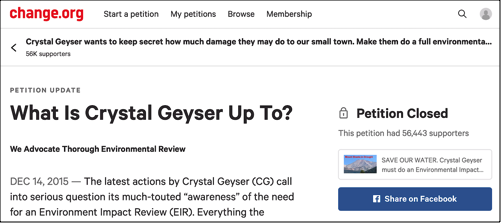
12/14/2015
The latest actions by Crystal Geyser (CG) call into serious question its much-touted “awareness” of the need for an Environment Impact Review (EIR). Everything the company is doing seems to be geared towards opening the plant without an EIR. At this time construction at the plant is proceeding and Crystal Geyser refuses to submit any permit applications that could trigger an EIR.
Polluting Boilers Installed
On September 29 Crystal Geyser submitted an application to the Siskiyou County Air Pollution Control Board (APCD) to install four steam boilers in their
Mount Shasta beverage plant (and plans show that a total of six boilers will eventually be installed). According to Crystal Geyser’s application these boilers will emit over 17 thousand tons of carbon dioxide a year in addition to thousands of pounds of other pollutants and poisons.
Amazingly, but unsurprisingly, the APCD approved installation of these boilers with no environmental impact report (EIR), using the excuse that each boiler by itself is below the amount requiring an environmental review, but refusing to consider them as a whole. By this logic there is no limit at all to the amount of steam boilers CG can install. But Crystal Geyser was so impatient to start polluting they installed the boilers before the permit to construct was granted, causing the County to fine them a thousand dollars for the violations. Crystal Geyser seems to want to take all sorts of shortcuts to get this plant in operation.

